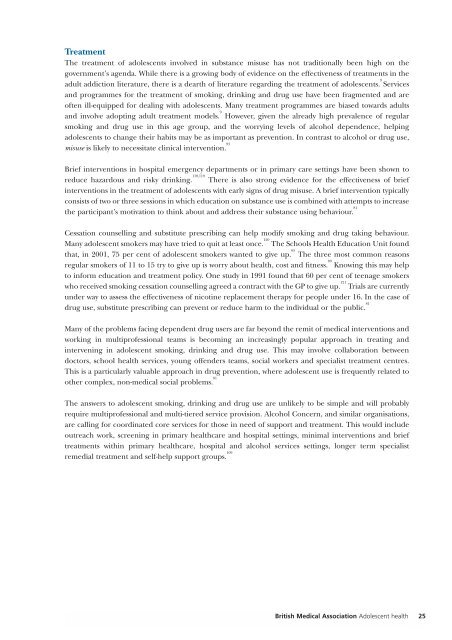Alcohol misuse: tackling the UK epidemic - London
Alcohol misuse: tackling the UK epidemic - London
Alcohol misuse: tackling the UK epidemic - London
Create successful ePaper yourself
Turn your PDF publications into a flip-book with our unique Google optimized e-Paper software.
Treatment<br />
The treatment of adolescents involved in substance <strong>misuse</strong> has not traditionally been high on <strong>the</strong><br />
government’s agenda. While <strong>the</strong>re is a growing body of evidence on <strong>the</strong> effectiveness of treatments in <strong>the</strong><br />
adult addiction literature, <strong>the</strong>re is a dearth of literature regarding <strong>the</strong> treatment of adolescents. 9<br />
Services<br />
and programmes for <strong>the</strong> treatment of smoking, drinking and drug use have been fragmented and are<br />
often ill-equipped for dealing with adolescents. Many treatment programmes are biased towards adults<br />
and involve adopting adult treatment models. 9<br />
However, given <strong>the</strong> already high prevalence of regular<br />
smoking and drug use in this age group, and <strong>the</strong> worrying levels of alcohol dependence, helping<br />
adolescents to change <strong>the</strong>ir habits may be as important as prevention. In contrast to alcohol or drug use,<br />
<strong>misuse</strong> is likely to necessitate clinical intervention. 93<br />
Brief interventions in hospital emergency departments or in primary care settings have been shown to<br />
reduce hazardous and risky drinking. 118,119<br />
There is also strong evidence for <strong>the</strong> effectiveness of brief<br />
interventions in <strong>the</strong> treatment of adolescents with early signs of drug <strong>misuse</strong>. A brief intervention typically<br />
consists of two or three sessions in which education on substance use is combined with attempts to increase<br />
<strong>the</strong> participant’s motivation to think about and address <strong>the</strong>ir substance using behaviour. 81<br />
Cessation counselling and substitute prescribing can help modify smoking and drug taking behaviour.<br />
Many adolescent smokers may have tried to quit at least once. 120<br />
The Schools Health Education Unit found<br />
that, in 2001, 75 per cent of adolescent smokers wanted to give up. 65<br />
The three most common reasons<br />
regular smokers of 11 to 15 try to give up is worry about health, cost and fitness. 89<br />
Knowing this may help<br />
to inform education and treatment policy. One study in 1991 found that 60 per cent of teenage smokers<br />
who received smoking cessation counselling agreed a contract with <strong>the</strong> GP to give up. 121<br />
Trials are currently<br />
under way to assess <strong>the</strong> effectiveness of nicotine replacement <strong>the</strong>rapy for people under 16. In <strong>the</strong> case of<br />
drug use, substitute prescribing can prevent or reduce harm to <strong>the</strong> individual or <strong>the</strong> public. 81<br />
Many of <strong>the</strong> problems facing dependent drug users are far beyond <strong>the</strong> remit of medical interventions and<br />
working in multiprofessional teams is becoming an increasingly popular approach in treating and<br />
intervening in adolescent smoking, drinking and drug use. This may involve collaboration between<br />
doctors, school health services, young offenders teams, social workers and specialist treatment centres.<br />
This is a particularly valuable approach in drug prevention, where adolescent use is frequently related to<br />
o<strong>the</strong>r complex, non-medical social problems. 81<br />
The answers to adolescent smoking, drinking and drug use are unlikely to be simple and will probably<br />
require multiprofessional and multi-tiered service provision. <strong>Alcohol</strong> Concern, and similar organisations,<br />
are calling for coordinated core services for those in need of support and treatment. This would include<br />
outreach work, screening in primary healthcare and hospital settings, minimal interventions and brief<br />
treatments within primary healthcare, hospital and alcohol services settings, longer term specialist<br />
remedial treatment and self-help support groups. 109<br />
British Medical Association Adolescent health 25
















